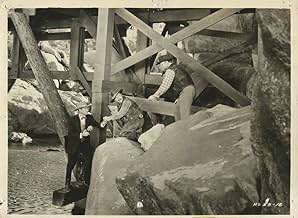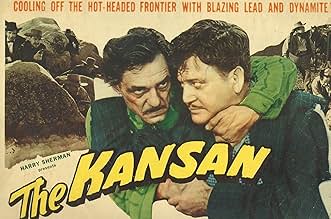AVALIAÇÃO DA IMDb
5,6/10
465
SUA AVALIAÇÃO
Adicionar um enredo no seu idiomaA cowboy injured fighting bank robbers awakens to find he's the new marshal. He faces off against the corrupt town banker who's exploiting the locals.A cowboy injured fighting bank robbers awakens to find he's the new marshal. He faces off against the corrupt town banker who's exploiting the locals.A cowboy injured fighting bank robbers awakens to find he's the new marshal. He faces off against the corrupt town banker who's exploiting the locals.
- Direção
- Roteiristas
- Artistas
- Indicado a 1 Oscar
- 1 indicação no total
Ray Bennett
- Messenger
- (as Raphael Bennett)
Gertrude Astor
- Blonde Townswoman
- (não creditado)
Walter Baldwin
- Judge Lorrimer
- (não creditado)
Ted Billings
- Barfly
- (não creditado)
- Direção
- Roteiristas
- Elenco e equipe completos
- Produção, bilheteria e muito mais no IMDbPro
Avaliações em destaque
Any film with Richard Dix is worth a chance not only because he's a likable and powerful figure but he seemed to bounce around the edges of the studio system so that his films vary standard formulas in unpredictable ways. The Kansan's saloon sets are excellent, for instance, and the crowds well directed--other posts mention the remarkably modern dance number (with perspectival backdrops) and the extended brawl with well-choreographed sequences and character highlights. Outdoor cinematography at the toll-bridge across which several incidents of the plot transpire featured impressive depth and angle.
A big stable of acting talent also raises this film's quality, but I'll let other posters provide those kudos.
My only difference with other posters is their near-blanket condemnation of the Bones character played by the terrific William Best. Certainly most of the film's racial dynamics are regrettably stereotypical, but Dix and Best interact as two smart guys recognizing each other. The film's single best moment for me was when the Jory character enters Best's servant quarters at the Sager Hotel. When Jory walks in, the Bones character is READING, which suggests that not just Willie Best but his character knows that Bones's minstrel persona is an act. Further, when Jory leaves the room, the door swings shut to reveal a portrait of Lincoln.
A big stable of acting talent also raises this film's quality, but I'll let other posters provide those kudos.
My only difference with other posters is their near-blanket condemnation of the Bones character played by the terrific William Best. Certainly most of the film's racial dynamics are regrettably stereotypical, but Dix and Best interact as two smart guys recognizing each other. The film's single best moment for me was when the Jory character enters Best's servant quarters at the Sager Hotel. When Jory walks in, the Bones character is READING, which suggests that not just Willie Best but his character knows that Bones's minstrel persona is an act. Further, when Jory leaves the room, the door swings shut to reveal a portrait of Lincoln.
The producing/directing team of Harry Sherman and George Archaimbaud who turned out a couple dozen Hopalong Cassidy movies moved away from Hoppy and the Bar 20 to give us The Kansan, an independent film from United Artists. This western stars Richard Dix as the Shane like character who takes a hand in stopping a bank robbery by the notorious James gang. Dix gets good and shot up for his troubles, but while he's on the mend he finds he's been elected town marshal.
Engineering his election is town banker Albert Dekker who has many interests, legal and extralegal and he'd like a gun-hand like Dix as marshal to look after those interests. Dekker has cause for regret as Dix takes the job very seriously. Dix also starts courting Jane Wyatt the local innkeeper.
That doesn't sit well with Victor Jory who is Dekker's brother. But Jory plays a lone hand in life as the film unfolds.
Dix's best years on screen were way behind him when he did The Kansan, but he could and does contribute a solid western characterization and gets solid support from the cast. Eugene Palette as a visiting cattle baron looks a bit lost in the western garb, but he works through it.
Western fans will recognize some distinct plot elements the Cecil B. DeMille classic Union Pacific. If you do you know exactly how The Kansan will end.
Engineering his election is town banker Albert Dekker who has many interests, legal and extralegal and he'd like a gun-hand like Dix as marshal to look after those interests. Dekker has cause for regret as Dix takes the job very seriously. Dix also starts courting Jane Wyatt the local innkeeper.
That doesn't sit well with Victor Jory who is Dekker's brother. But Jory plays a lone hand in life as the film unfolds.
Dix's best years on screen were way behind him when he did The Kansan, but he could and does contribute a solid western characterization and gets solid support from the cast. Eugene Palette as a visiting cattle baron looks a bit lost in the western garb, but he works through it.
Western fans will recognize some distinct plot elements the Cecil B. DeMille classic Union Pacific. If you do you know exactly how The Kansan will end.
In Broken Lance, Kansas, John Bonniwell averts the Jesse James gang from holding up the town bank, but is severely wounded in the process. When he awakes in the hospital, he finds that he has been elected town marshall, with high recommendations from the bank owner and leading citizen, Steve Barat. Bonniwell accepts the job (especially after getting an eyeful of the hotel owner Eleanor Sager) even though he knows that he was only appointed to become a pawn in Barat's scheme to bleed Broken Lance, and the Kansas, dry. Bonniwell's position is put to the test when Barat sues Bonniwell's friend Waggoner for running his cattle without paying the $1 a head toll enforced by Barat. When he sees that Bonniwell isn't going to be controlled so easily, Barat has Bonniwell's enemies go after him followed by an attempt by Barat's gambling brother, Jeff (who seems to be playing both sides of the standoff, while in love with Eleanor). Bonniwell then starts to rid Broken Lance of Barat's influence without losing his life, or anyone else's, in the process. Very good western with an excellent script, direction, characterization, and performances by everyone. Dix is right at home as Bonniwell, even though he seems awkward at times. Jory gives one of his best performances as Jeff, and his characterization is very surprising and different from others in the genre. The movie also contains one of the biggest barroom free for alls in any western, with everyone getting into the fracas. Only flaw was the climax was not as action packed as other sequences in the movie, but still a winner all the way. Rating, based on B westerns (this may count as a B+ however), 9.
This probably doesn't deserve the "B Movie" sobriquet. The production values are pretty high and it is quite heavy on the movie stars. This looks to me like it would have taken the A spot on a bill. Dix is good but Victor Jory nearly steals the show. The high point is likely one of the most over-the-top barroom brawls I've ever seen on celluloid. The script is also fine, although nothing too original. The low point in the movie....aside from a really unfortunate racial caricature.... is probably represented by a really ghastly World War II style showgirl routine based around "When Johnny Comes Marching Home". All in all, a satisfying show.
Richard Dix finds himself elected sheriff of a small town run by land baron Albert Dekker after helping foil a robbery in this B-Western from the '40s. Dekker's the one who had him elected in the expectation that he would become just another of his puppets - but this is Dickie Dix we're talking about, and he's not about to be any man's doormat, even if he does look a little careworn at this stage of his career (death from heart attack was only 6 years away). The widely under-praised Victor Jory plays Dekker's brother, a gambler whose uncertain allegiance to either side makes him by far the film's most interesting character.
Você sabia?
- CuriosidadesThis was one of two dozen Walter Wanger/Harry Sherman/Cinema Guild films originally released by United Artists, re-released theatrically in 1948 by Masterpiece Productions, and ultimately sold by them for US television syndication in 1950. It was first telecast in Los Angeles Sunday 2 April 1950 on KTLA (Channel 5), in Detroit Sunday 7 May 1950 on WXYZ (Channel 7), in New York City Saturday 17 June 1950 on WCBS (Channel 2), in Phoenix Sunday 9 July 1950 on KPHO (Channel 5), in Albuquerque Tuesday 25 July 1950 on KOB (Channel 4), in Cleveland Sunday 30 July 1950 on WXEL (Channel 9), Chicago Monday 21 August 1950 on WENR (Channel 7), in Atlanta Thursday 24 August 1950 on WSB (Channel 8), in Philadelphia Saturday 2 September 1950 on WFIL (Channel 6), in Cincinnati Saturday 9 September 1950 on WKRC (Channel 11), in Pittsburgh Thursday 14 September 1950 on WDTV (Channel 3), in San Francisco Saturday 30 September 1950 on KGO (Channel 7), and in Boston Sunday 8 October 1950 on WNAC (Channel 7),
- Citações
Josh Hudkins: [to Bonniwell] Marshal, I'm the mayor here. Aren't you overstepping your authority?
- ConexõesFeatured in Doctor Who: The Tenth Planet: Episode 2 (1966)
Principais escolhas
Faça login para avaliar e ver a lista de recomendações personalizadas
Detalhes
- Tempo de duração1 hora 19 minutos
- Cor
- Proporção
- 1.37 : 1
Contribua para esta página
Sugerir uma alteração ou adicionar conteúdo ausente




































